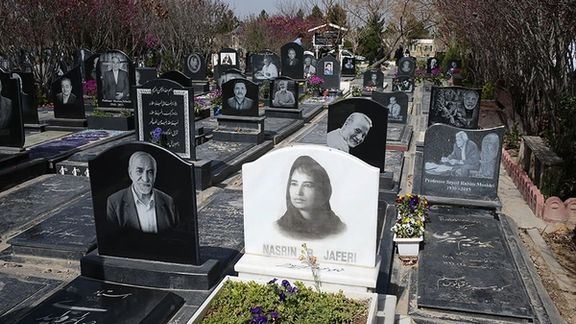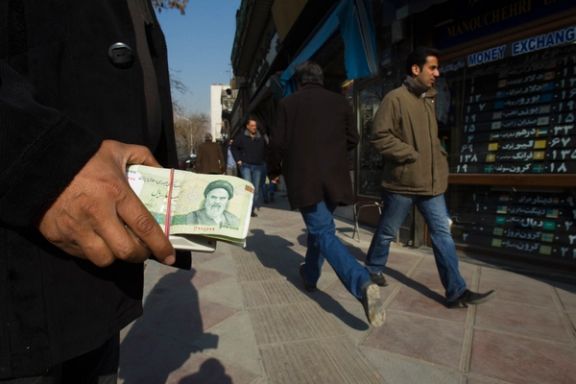Tehran Cemetery Bans Unveiled Women's Headstone Photos

The CEO of Tehran's largest cemetery says the images of unveiled women cannot be shown on headstones in the latest announcement of the regime's crackdown on hijab laws.

The CEO of Tehran's largest cemetery says the images of unveiled women cannot be shown on headstones in the latest announcement of the regime's crackdown on hijab laws.
Speaking to Didban Iran on Monday, Mohammad Javad Tajik stated that “displaying images of women without hijab on tombstones poses a challenge, and inscriptions and images contradicting societal norms should not be engraved on graves.”
The declaration underscores ongoing efforts by Iranian authorities to enforce compulsory hijab, even in cemeteries. In 2022, Iran initiated measures to enforce hijab on tombstones at Behesht-e Zahra, the country's largest cemetery situated in southern Tehran.
Saeed Ghazanfari, director of Behesht-e Zahra, confirmed in June 2022 that approximately 100 gravestones featuring photos of deceased women without veils had been removed. Ghazanfari indicated that this process would continue in line with the guidance of religious scholars until all such gravestones are removed. A team has been established to prevent the installation of stones bearing unconventional images.
Recent months have witnessed an escalation in government crackdowns on hijab law from heavier surveillance to bans on the likes of education and public spaces, with increasing detentions by morality police. Additionally, the Iranian regime has shuttered thousands of businesses for non-compliance with mandatory hijab, leading to significant job losses.
Prominent establishments, including restaurants and cafes owned by celebrity figures and popular athletes, have faced closure or warnings due to staff and customers violating hijab rules.

Iranian proxies are alleged to have killed six fighters from US-backed Kurdish forces after a drone strike targeted a military academy in a US base near the Al Omar oil field in Syria.
The drone strike is believed to have originated from areas under Syrian government control in Deir al Zor and where Iran-backed militia are known to operate and launch such attacks.
The incident unfolds amidst heightened tensions in the region, with Iran-backed groups expressing solidarity with Palestinians amid escalating conflict between Israel and Hamas. Across the Middle East, Iran's militias in Lebanon, Syria, Iraq and Yemen have launched attacks on Israel and the US since October 7.
Iran-backed Hamas invaded Israel on the most deadly single day for Jews since the Holocaust, sparking a bitter response from Israel which has led to a wider regional conflict.
In response to an attack in Jordan that claimed the lives of three US soldiers and injured dozens more, this weekend saw attacks launched against Iran-affiliated targets in Yemen, Iraq and Syria. It comes after more than 160 attacks have been launched on US targets since October 7 alone, as a response to US support for Israel's right to defend itself in the wake of the October 7 atrocities.

There seems to be a deep sense of insecurity among Iranians due to intense conflicts in the Middle East and a high level of tensions with the United States.
Iranians on social media express their worries every morning about a potential war in the region that could drag Iran into fire. They also discuss a growing economic crisis that is making life increasingly difficult, even for those who are considered well-off.
One of the ongoing concerns is about US responses to Houthi strikes on commercial shipping and attacks by Iranian proxy groups on US forces, that last week left three US soldiers dead in the border area between Syria and Jordan.
Asghar Zargar, a lecturer on international relations, told centrist Entekhab website that "It is unlikely the US would strike Iran." He added that that the United States will not do anything that would threaten the security of the Persian Gulf as Washington does not want to see oil prices rising. However, Zargar noted that if Iran comes under attack, Tehran will launch a heavy retaliatory operation, targeting ships within the range of Iranian forces.
Last week, the looming shadow of a war involving Iran led to an extraordinary rise in exchange rates, bringing the price of every US dollar close to 600,000 Iranian rials.

Zargar further explained that now with insecurity in the Red Sea region, the United States will not risk threatening the security of the Persian Gulf. On the other hand, the Americans are aware that Iran will not remain silent if its territory comes under attack, which would set the Persian Gulf ablaze.
For ordinary Iranians, however, it is not a matter of pride or military might. It is a matter of life and death and survival under pressure.
The pressure from America, is not the only threat perceived by Iranians. The former head of the parliament's National Security and Foreign Relations Committee, Heshmatollah Falahatpisheh said last week, "The Russians have made Iran their accomplice and partner in crime in their war in Ukraine."
Falahatpisheh added that "From Syria to Palestine, the Russians position on Iran's strategic depth has been one of treason. They wanted Iran to be their partner in crime and that is why they said that they get their drones from Iran."
Iran’s militant proxy forces in Iraq and Syria have launched more than 160 rocket and drone attacks on US forces since mid-October. Zargar, who lives in Tehran and must be mindful of his public statements, noted that US forces have faced attacks in the region since 2003, with approximately 4,000 US troops losing their lives in military operations. However, the recent deaths of three US soldiers have heightened American sensitivity to such incidents. Still, Zargar suggested that the US is more likely to attack Iran's interests in the region rather than striking targets within Iran.
Highlighting the danger of Iranian officials and commanders focusing on missile development and using them against neighbors, former Foreign Minister Javad Zarif quoted former President and Expediency Council Chief Akbar Hashemi Rafsanjani, who said, "Missiles are good but they are not the answer to every problem." Zarif added that in today's world, there are multiple sources of power, and Iran should recognize its area of relative superiority in the international arena. He suggested that Iran advocate the idea of a cease-fire in the Gaza war to reduce international pressure on Tehran.
Zarif added: "In today's world there are multiple sources of power, but we have still not recognized our area of relative superiority," meaning that officials and commanders should not be deceived by their own words about Tehran's massive missile power.

Iran utilized two major UK banks to clandestinely transfer funds globally as part of an extensive sanctions-evasion plot.
Documents reviewed by the Financial Times reveal that British front companies, covertly owned by a sanctioned Iranian petrochemicals firm located near Buckingham Palace, held accounts with the banks, Santander and Lloyd’s.
The state-controlled Petrochemical Commercial Company (PCC), a central figure in the scheme, is accused by the US of raising substantial sums for the Iranian Revolutionary Guards Quds Force and collaborating with Russian intelligence to fund Iranian proxy militias. Both PCC and its UK subsidiary, PCC UK, have been subject to US sanctions since November 2018.
Recent disclosures about the sanctions-evasion operation in the heart of London, emerge following the Royal Air Force's participation in US airstrikes against Iranian-backed Houthi rebels in Yemen. Additionally, both the UK and US have imposed sanctions on what they describe as a "transnational assassinations network" overseen by Iranian intelligence, targeting activists and dissidents, including British residents.
Financial documents scrutinized by the Financial Times indicate that PCC, following its sanctioning by the US, utilized UK-based entities to receive funds from Iranian fronts in China, concealing their true ownership through trustee agreements and nominee directors.
European banks found complicit in breaching US sanctions on Iran have faced significant penalties, with Standard Chartered and UniCredit paying over $1 billion each in fines in 2019.

The top sunni cleric in Iran has said that the death of a young Baluch man claimed to have been killed by security forces is suspicious and authorities must reveal the truth about the incident.
“Sepehr Shirani was killed in a suspicious manner. Anyone who has been involved in his killing should be punished,” Mowlavi Abdolhamid Esmaeil-Zehi said in his Friday sermon on February 2.
Shirani, a 19-year-old student from the small town of Fanuj in the southwest of Sistan and Baluchestan Province of Iran, went missing Tuesday, January 30. He lived and studied in the provincial capital Zahedan.
According to Haalvsh, a website dedicated to human rights issues and events in Sistan-Baluchestan, Shirani’s family found out that he was in the custody of the Revolutionary Guards (IRGC) Intelligence Organization (SAS) after checking with local police and security authorities. They were told he had been detained for his social media activities but would be released “after a few questions”.
An informed source told Haalvsh that Shirani’s body, shot in the head, was discovered early Thursday morning on the rooftop of the apartment building where he lived. His family say they had not been informed of his release and he had returned to his home.
The public and revolutionary prosecutor of Sistan and Baluchestan, Mehdi Shamsabadi, on Thursday denied reports of Shirani’s death under torture at IRGC’s detention facility in Zahedan.
Shamsabadi also denied Shirani’s arrest by security agencies and said preliminary information indicate that he committed suicide.
Rasad Baluchestan, a Telegram channel dedicated to news on the Baluchi ethnic population of Iran, quoted Shirani’s relatives as saying that the claim of suicide is false and he was beaten to death by a stick in the custody of the intelligence ministry.
According to Haalvsh, authorities only consented to hand over Shirani’s body to his family for burial after forcing them pledge to keep quiet about the circumstances of his death.
Shirani was buried in his hometown of Fanuj Friday. The Telegram channel of Baluch Activists Campaign has released a video of the burial.
Burial of Shirani’s body in his hometown of Fanuj.
Haalvsh which also claims the family have been forced into silence reported on Friday that Shirani’s body showed bruises resulting from being whipped and his right arm was broken.
The situation in Iran's southeastern Baluch region including the city of Zahedan has been very tense since September 30, 2022. Security forces opened fire on protesters on that day, day which is now often referred to as the Bloody Friday and killed nearly 90 including women and children.
Since Bloody Friday, local Sunnis have protested every week after Friday prayers. Many who worked at Makki Mosque, where the Friday prayers are held, or were associated with the mosque and its charismatic leader Abdolhamid have been arrested in the past year.
An informed source told Haalvsh that security forces had warned Shirani about his support for the weekly protests in Zahedan on social media as well as helping the security of Makki Mosque as a volunteer. The source claimed that Shirani had refused to obey the security forces’ demand not to post anything about the protests.

The Mayor of Tehran revealed that significant agreements for investment and construction projects have been reached with Chinese entities following his recent trip to China.
On Sunday, Alireza Zakani made the announcement during a session of the Tehran City Council, providing a detailed report on his October visit to China, stating three contracts have been signed in phase one of the deals.
The agreements included the purchase of 751 railway wagons, one million vans, motorcycles, and buses, as well as the construction of metro line 11.
He also announced plans for the construction of hotels, buildings, amusement parks, and water parks within Tehran. He outlined, "We have finalized agreements to develop five five-star hotels in collaboration with Chinese companies, industrialize 200,000 housing units, and establish two amusement parks and two water parks in Tehran."
In January, Hamidreza Saremi, the Deputy Mayor of Tehran, revealed discussions regarding the Chinese Housing Construction plan, stating, "We have initiated negotiations with Chinese developers, leading to the allocation of parcels of land exceeding one hectare in size in the southern regions of the city."
During his campaign, President Ebrahim Raisi pledged to build one million housing units annually. However, housing market experts and politicians have criticized this commitment as "impractical." The average price of one square meter of housing in Tehran stands at approximately 600 million rials ($1,200), significantly surpassing the monthly minimum wage of around $120 (excluding benefits).